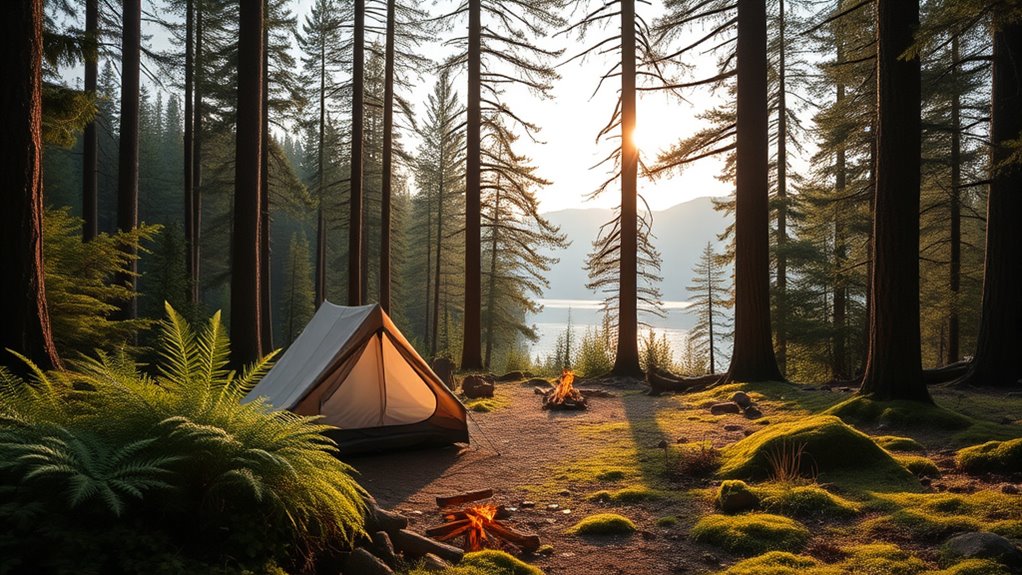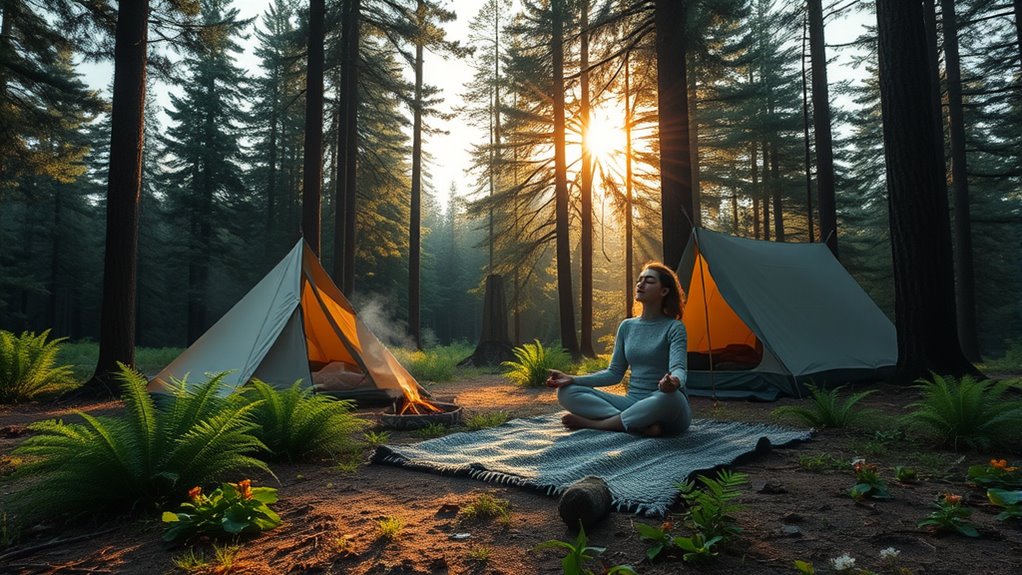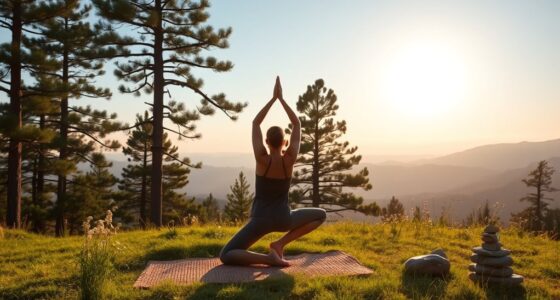Mindful camping helps support your mental health by encouraging you to fully engage with nature, which reduces stress and boosts relaxation. Focusing on your surroundings—sounds, sights, smells—creates a sense of presence that calms the mind and lessens anxiety. Disconnecting from screens allows mental clarity and fosters gratitude. Incorporating mindful practices during your trip deepens these benefits, nurturing your overall well-being. Exploring this approach further can help you harness nature’s healing power for lasting mental clarity.
Key Takeaways
- Engaging with nature during camping reduces stress and cortisol levels, promoting mental well-being.
- Practicing mindfulness activities like sensory awareness enhances relaxation and emotional regulation.
- Disconnecting from digital devices fosters mental clarity and a deeper connection to the environment.
- Immersive outdoor experiences slow pace and encourage reflection, reducing anxiety and mental fatigue.
- Camping serves as an accessible, natural therapy that nurtures overall mental health through presence and grounding.

Have you ever considered that camping can be more than just a getaway—it can be a chance to reconnect with nature and yourself? When you immerse yourself in the outdoors, you’re creating an opportunity to strengthen your nature connection, which is essential for mental well-being. Spending time in nature reduces stress by activating your parasympathetic nervous system, promoting relaxation and calmness. Scientific studies show that even brief outdoor experiences can lower cortisol levels, the hormone linked to stress, making camping an effective natural remedy for mental fatigue.
Camping reconnects you with nature, reducing stress and promoting mental well-being through relaxation and mindfulness.
As you set up camp and breathe in the fresh air, you’re engaging in intentional presence—an act of mindfulness that draws your attention away from daily worries. This moment-to-moment awareness allows you to fully experience the sights, sounds, and smells of your environment. By consciously observing the rustling leaves, chirping birds, or the feel of cool grass beneath your feet, you’re anchoring yourself in the present. This practice fosters a sense of grounding, helping to alleviate anxiety and depressive symptoms that often stem from rumination or overwhelming thoughts.
Incorporating mindful practices into your camping routine can deepen this connection and enhance stress relief. Simple activities like mindful breathing, where you focus on each inhale and exhale, or sensory awareness exercises, where you notice textures, sounds, and scents, can amplify the calming effects of nature. These practices not only promote relaxation but also cultivate a greater appreciation for your surroundings, fostering gratitude and a sense of wonder.
Camping also encourages a break from digital distractions, which often contribute to mental clutter and stress. By disconnecting from screens and social media, you give your mind space to reset. This digital detox enhances your ability to be present and fully engage with the natural environment around you, reinforcing your sense of connection to the world outside your daily routine.
Ultimately, mindful camping offers a powerful, accessible way to support mental health. It allows you to slow down, observe, and appreciate the natural world, which can lead to significant reductions in stress and a renewed sense of clarity. When you approach camping with mindfulness, it becomes not just a leisure activity but a therapeutic practice—one that nurtures your mind, body, and spirit through genuine nature connection and stress relief.
Frequently Asked Questions
How Can Camping Improve Mental Health in the Long Term?
Camping deepens your nature connection, which can lead to lasting stress reduction. Regular outdoor experiences help you develop resilience against daily stressors, improve mood, and foster mindfulness. Over time, these benefits build a healthier mental outlook, promoting long-term well-being. By consistently engaging with nature, you nurture a sense of calm and clarity that supports mental health well beyond your camping trips.
What Are the Best Mindfulness Exercises for Campers?
You can practice mindfulness exercises like nature immersion and breathing techniques while camping. Focus on immersing yourself fully in the natural surroundings—listen to sounds, feel textures, and observe details. Combine this with deep, slow breathing to calm your mind and reduce stress. These exercises help you stay present, foster mental clarity, and promote emotional resilience, making your camping experience both restorative and grounding.
How Do I Start Mindful Camping if I’M a Beginner?
To start mindful camping as a beginner, choose simple camping gear and prioritize campsite selection by finding a quiet, natural spot. Focus on staying present—notice the sounds, smells, and sights around you. Set aside a few minutes daily for breathing exercises or sensory awareness. Remember, it’s about gentle observation and acceptance, not perfection. With patience, you’ll find camping becomes a calming, restorative practice supporting your mental well-being.
What Safety Precautions Should I Take During Mindful Camping?
During mindful camping, you should prioritize safety by staying aware of wildlife encounters and practicing fire safety. Keep a safe distance from animals, store food securely, and avoid startling wildlife. Always follow fire regulations, extinguish fires completely, and keep water or a fire extinguisher nearby. Being attentive and prepared helps protect both you and nature, ensuring a safe, peaceful experience that supports your mental well-being.
Can Mindful Camping Help With Specific Mental Health Conditions?
Yes, mindful camping can help with mental health conditions like anxiety and depression by fostering a strong nature connection and reducing stress. Being in nature encourages relaxation, mindfulness, and a sense of calm, which can lessen symptoms. Regular outdoor experiences support emotional resilience and promote mental clarity. So, if you’re seeking natural ways to improve mental well-being, mindful camping offers a supportive, evidence-based approach to managing these conditions.
Conclusion
By embracing mindful camping, you open the door to nature’s healing power, like a gentle balm for your mind. As you breathe in the fresh air and focus on the present, you nurture your mental health, reducing stress and boosting resilience. Remember, this experience is your anchor—a safe harbor amidst life’s storms. So, step outside, breathe deeply, and let nature’s calm wash over you, guiding you toward greater well-being with each mindful moment.










